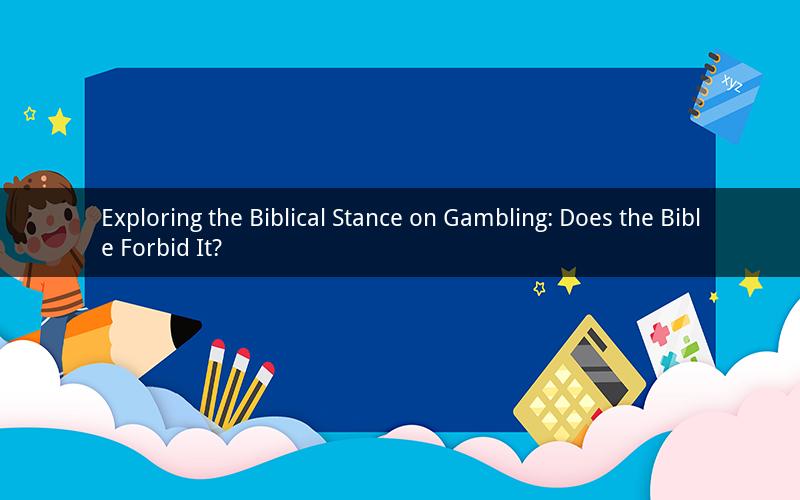
Introduction:
Gambling has been a topic of controversy and debate for centuries. With its widespread presence in modern society, many people wonder if gambling is considered a sin according to the Bible. In this article, we will delve into the biblical stance on gambling and analyze whether or not the Bible explicitly forbids it.
1. Understanding the Context:
To fully comprehend the biblical perspective on gambling, it is essential to understand the historical and cultural context in which the Bible was written. The Bible, particularly the Old and New Testaments, was compiled over several centuries, reflecting the beliefs and values of the ancient Jewish and Christian communities.
2. The Commandments:
One of the fundamental teachings of the Bible is the Ten Commandments, which were given to Moses by God. While the Ten Commandments do not explicitly mention gambling, they do address various forms of dishonesty and greed. Commandments like "Thou shalt not steal" (Exodus 20:15) and "Thou shalt not covet" (Exodus 20:17) indirectly relate to the moral implications of gambling.
3. The New Testament Perspective:
The New Testament, written in the first century AD, offers insights into the teachings of Jesus Christ and the early Christian community. While Jesus did not explicitly mention gambling, He emphasized the importance of honesty, integrity, and self-control. These values are often associated with the moral considerations of gambling.
4. The Parable of the Rich Fool:
In the Gospel of Luke, Jesus tells the parable of the rich fool, who amassed wealth but did not prioritize spiritual matters. This parable can be interpreted as a warning against excessive materialism and a focus on earthly pursuits, including gambling. While not a direct prohibition of gambling, it serves as a reminder to prioritize spiritual values over materialistic desires.
5. The Moral Considerations:
The moral considerations surrounding gambling can be analyzed from various perspectives. Some argue that gambling is inherently wrong due to its association with greed, dishonesty, and addiction. Others contend that gambling can be a form of entertainment or a way to support charitable causes.
6. The Role of Personal Responsibility:
While the Bible does not explicitly prohibit gambling, it emphasizes the importance of personal responsibility and self-control. Individuals are encouraged to make informed decisions and avoid engaging in activities that lead to harm or addiction. This includes gambling, as it can have detrimental effects on individuals, families, and communities.
7. The Cultural and Historical Perspective:
The biblical stance on gambling should be understood within the context of its historical and cultural setting. In ancient societies, gambling was often associated with idolatry and corrupt practices. However, in modern societies, gambling has evolved into a diverse and regulated industry.
8. The Christian Community's Diverse Views:
Within the Christian community, there is no consensus on whether or not gambling is inherently wrong. Some denominations view gambling as a sin, while others believe it can be morally permissible as long as it is conducted responsibly and for charitable purposes.
9. The Importance of Wisdom and Temperance:
The Bible repeatedly emphasizes the importance of wisdom and temperance in all aspects of life. When it comes to gambling, Christians are encouraged to exercise self-control, make informed decisions, and avoid excessive risk-taking. This aligns with the broader biblical teaching on ethical living.
10. Conclusion:
In conclusion, while the Bible does not explicitly forbid gambling, it offers moral guidance and emphasizes the importance of personal responsibility and self-control. Christians are encouraged to consider the potential consequences of gambling and make informed decisions based on their values and beliefs. Ultimately, the decision to engage in gambling should be made with wisdom and discernment.
Questions and Answers:
1. Q: Does the Bible explicitly mention gambling as a sin?
A: No, the Bible does not explicitly mention gambling as a sin. However, it addresses moral principles that can be associated with gambling, such as greed and dishonesty.
2. Q: Why do some Christians believe gambling is a sin?
A: Some Christians believe gambling is a sin due to its association with greed, dishonesty, and addiction. They argue that it can lead to harm and is incompatible with biblical values of wisdom and self-control.
3. Q: Can gambling be morally permissible in the Christian faith?
A: Some Christians argue that gambling can be morally permissible as long as it is conducted responsibly, without excessive risk-taking, and for charitable purposes.
4. Q: How should Christians approach gambling?
A: Christians are encouraged to approach gambling with wisdom, self-control, and informed decision-making. They should consider the potential consequences of gambling and prioritize spiritual values over materialistic desires.
5. Q: Can gambling be a form of entertainment for Christians?
A: While gambling can be a form of entertainment for some individuals, Christians are advised to exercise caution and moderation. They should prioritize activities that align with biblical values and avoid excessive risk-taking.